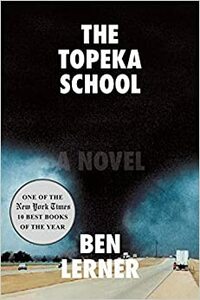You need to sign in or sign up before continuing.
Take a photo of a barcode or cover
Coronavirus (update: Coronavirus + Rebellion 2020) book review #21 – 3 stars
Meh. This book is disjointed until it isn’t and all of Lerner’s big ideas come crashing together. Or maybe they don’t for some readers (based on some of the other reviews I read).
Honestly, this book was a bit heavy-handed in attempting to show the interconnectedness of it all with language and psychology steering the ship. I felt like I was being hit over the head at times with Lerner repeating phrases and ideas to illustrate how we’re all being spread from one point to another.
And let’s get to what I did like, how we’re all living in the spread. More arguments. More evidence. In a constant state of refutation. We can no longer afford the people who once would listen because our health insurance no longer covers it. Late capitalism is destroying us as if we're living in a high school debate tournament.
Meh. This book is disjointed until it isn’t and all of Lerner’s big ideas come crashing together. Or maybe they don’t for some readers (based on some of the other reviews I read).
Honestly, this book was a bit heavy-handed in attempting to show the interconnectedness of it all with language and psychology steering the ship. I felt like I was being hit over the head at times with Lerner repeating phrases and ideas to illustrate how we’re all being spread from one point to another.
And let’s get to what I did like, how we’re all living in the spread. More arguments. More evidence. In a constant state of refutation. We can no longer afford the people who once would listen because our health insurance no longer covers it. Late capitalism is destroying us as if we're living in a high school debate tournament.
But there are no grown-ups, that’s what you must grow up to know fully; your parents were just two more bodies experiencing landscape and weather, trying to make sense by vibrating columns of air.
challenging
reflective
slow-paced
Plot or Character Driven:
Character
Strong character development:
Complicated
Loveable characters:
Complicated
Diverse cast of characters:
No
Flaws of characters a main focus:
Complicated
She compiled almost all of their research, having attended a 'debate institute' at the University of Michigan over the summer to get a head start on the competition. (The topic this year was whether the federal government should establish new polices to reduce juvenile crime; their plan argued that strengthening child support enforcement would do so in various ways.) Adam's contribution to prep work consisted of skimming The Economist during debate class. His strength was thinking on his feet, exposing fallacies; his cross-examinations were widely feared.
the origin of sarcasm is anxiety
His parents had insisted, with rare resolve, that he either consult with Erwood or start conventional talk therapy. The intensity, they said, was out of control, how quick he was to rage, even if he was relatively quick to cool. He needed 'strategies'. His mom would ask him to get the dirty dishes out of the living room where he wasn't really supposed to be eating anyway. I'll do it later, he'd say; I'd like you to do it now, she'd respond; then out him would issue an overwhelming barrage of ridiculous but somehow irrefutable arguments about her nagging, her hypocrisy, her failure to abide by the precepts she laid out in her books, her bizarre focus on the conventional domestic order over the autonomy of others; again and again, she failed to prove topicality. The dishes remained where they were.
as psychotherapists, they were much less afraid of open conflict than of the prospect of a kid withdrawing, dissapearing into his room, into himself, a lost boy.
Part of what made the migranes so terrible was his belief that he had caused them. You're going to give yourself a migraine, he often heard, often warned himself. if the cause of the headache was stress, then every intese thought, wrong desire, real or imagined conflict, would return to him in the form of pain. The pressures of passing himself off as a real man, of staying true to type - the constant weight lifting, the verbal combat - would eventually reduce him to a child again, calling out for his mother from his bed.
But I was also encountering more and more patients whose suffering wasn't clearly related to their circumstances, or whose circumstances were most notable for their normality - intelligent middle-class white kids from stable homes who were fine until they weren't, the lost boys of privilage.
my goal was the make the kid feel heard. I didn't mind the cliche; in fact, I admired the phrase, its rightness of fit, a mixture of the somatic and semantic
It was kind of like that, recovering the memory of what my father had done. The knowledge was always there, I carried it in my body, but I didn't know what I knew, although I knew I knew something and that I dreaded knowing it fully, dreaded it as if only coming into the konwledge, into the memory, would make the event real.
went on and on in a monotone about how a medical student should know better than to mix opioids and alcohol-talking about her heavily sedated brother's attempt to kill himselft as if it were just another acadmeic failure, a poor graps of chemistry.
to overcome polarization without shaming
The problem for him in high school was that debate made you a nerd and poetry made you a pussy - even if both could help you get to the vaguely imagined East Coast city from which your experiences in Topeka would be recounted with great irony. They key was to narrate participation in debate as a form of linguistic combat; the key was to be a bully, quick and vicious and ready to spread an interlocutor with insults at the smallest provocation. Poetry could be excused if it upped your game, became cipher and flow, if it was part of why Amber was fucking you and not Reynolds et al. If linguistic prowess could do damage and get you laid, then it could be integrated into the adolescent social realm without entirely departing from the household values of intellect and expression It was not a reconciliation, but a workable tension. His disastrous tonsorial compromise. The migraines.
Maybe they were only pretedning to read. (I often suspected that people were only going through the motions of reading, or mimicking its stillness; did I pretend to read as a child, maybe as a way of escaping something - my father's anger? Walking through the library in graduate school, I'd think to myself: Not a single one of you people, if I shut your book, would be able to tell me what you've just read. Shadow-reading. And when I myself was reading, I was acutely aware of other people watching me, of how I performed absorption, which of course distracted me from the page.)
[White people] didn't even exist in [their] economy; we'd either be charged five hundred percent over market for dumplings or they'd be given to us for free.
I saw these dynamics, thought seeing them protected me somehow, which is the stupid mistake psychologists make, a very Foundation mistake; we thought that if we had a language for our feelings we might transcend them.
The remainder of my consciousness was devoted to trying to think of my bully of a son as a vulnerable young man passing through a complicated social and hormonal stage.
your parents were just two more bodies experiencing landscape and weather, trying to make sense by vibrating columns of air, redescribing contingency as necessity
Standing in the shower, I felt as though twenty years had been erased, washed off me, as if I emerged eighteen again, an unsettling feeling compounded by the fact that Natalia had taken the girls for a walk around the neighborhood of Victorian houses and cobblestone streets, no sound of the family I'd made, it was all a dream
now i just want a full book about Ben Lerner's dad
HATED IT - read for Book Club. Did not care for the characters or their stories. The blurb on the book jacket did not match the story. Too many moments where I thought the author wanted to write a book to include this sentence.
emotional
hopeful
inspiring
reflective
slow-paced
Plot or Character Driven:
Character
Strong character development:
Yes
Loveable characters:
Yes
Diverse cast of characters:
No
Flaws of characters a main focus:
Yes
I really wanted to like this more than I did. There were some really rewarding passages, but overall I just struggled to feel invested in any way.
I feel like I read this from behind thick glass. Like watching the Kardashian’s or Wolf of Wall Street, I had a disassociated intrigue about the narrative of these privileged characters, but felt no empathy. The further into this book I got the further Lerner’s writing disintegrated into some vague point about toxic masculinity that never seemed to go anywhere. Nothing lingers expect a distant disdain for the type of lives portrayed.




